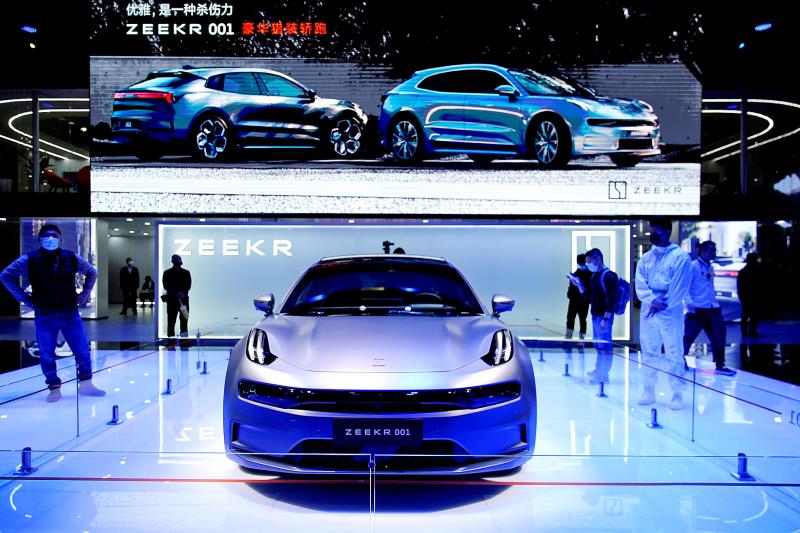China is to end subsidies for electric and hybrid vehicles at the end of the year, authorities have announced, saying the strength of sales in the sector meant state support was no longer needed.
Purchase subsidies would be reduced by 30 percent from the beginning of this year before being scrapped completely by the end of the year, the Chinese Ministry of Finance said in a statement on Friday.
“Given the growth of the industry for vehicles with new energy, the sales trends and the smooth transition of manufacturers, the subsidies ... will end on December 31,” the ministry said. “Vehicles registered after December 31, 2022, will not be subsidized.”

Photo: Reuters
Sales of electric and hybrid vehicles have boomed in China, with annual increases of more than 100 percent in the past few months.
The vehicles are set to represent 18 percent of all vehicle sales this year, the China Association of Automobile Manufacturers (CAAM) estimated last week.
In 2019, they accounted for only 5 percent.
Of the 27.5 million vehicles set to be sold this year, 5 million would be electric and hybrids, CAAM said.
Overall growth in the world’s largest market for vehicles would likely come in at 3.1 percent for last year — the first year of sales growth since 2018, the association said.
China, the world’s largest polluter, has set ambitious goals for the widespread adoption of electric and hybrid vehicles, and aims to have the majority of vehicles powered with clean energy by 2035.

MULTIFACETED: A task force has analyzed possible scenarios and created responses to assist domestic industries in dealing with US tariffs, the economics minister said The Executive Yuan is tomorrow to announce countermeasures to US President Donald Trump’s planned reciprocal tariffs, although the details of the plan would not be made public until Monday next week, Minister of Economic Affairs J.W. Kuo (郭智輝) said yesterday. The Cabinet established an economic and trade task force in November last year to deal with US trade and tariff related issues, Kuo told reporters outside the legislature in Taipei. The task force has been analyzing and evaluating all kinds of scenarios to identify suitable responses and determine how best to assist domestic industries in managing the effects of Trump’s tariffs, he

TIGHT-LIPPED: UMC said it had no merger plans at the moment, after Nikkei Asia reported that the firm and GlobalFoundries were considering restarting merger talks United Microelectronics Corp (UMC, 聯電), the world’s No. 4 contract chipmaker, yesterday launched a new US$5 billion 12-inch chip factory in Singapore as part of its latest effort to diversify its manufacturing footprint amid growing geopolitical risks. The new factory, adjacent to UMC’s existing Singapore fab in the Pasir Res Wafer Fab Park, is scheduled to enter volume production next year, utilizing mature 22-nanometer and 28-nanometer process technologies, UMC said in a statement. The company plans to invest US$5 billion during the first phase of the new fab, which would have an installed capacity of 30,000 12-inch wafers per month, it said. The

Taiwan’s official purchasing managers’ index (PMI) last month rose 0.2 percentage points to 54.2, in a second consecutive month of expansion, thanks to front-loading demand intended to avoid potential US tariff hikes, the Chung-Hua Institution for Economic Research (CIER, 中華經濟研究院) said yesterday. While short-term demand appeared robust, uncertainties rose due to US President Donald Trump’s unpredictable trade policy, CIER president Lien Hsien-ming (連賢明) told a news conference in Taipei. Taiwan’s economy this year would be characterized by high-level fluctuations and the volatility would be wilder than most expect, Lien said Demand for electronics, particularly semiconductors, continues to benefit from US technology giants’ effort

‘SWASTICAR’: Tesla CEO Elon Musk’s close association with Donald Trump has prompted opponents to brand him a ‘Nazi’ and resulted in a dramatic drop in sales Demonstrators descended on Tesla Inc dealerships across the US, and in Europe and Canada on Saturday to protest company chief Elon Musk, who has amassed extraordinary power as a top adviser to US President Donald Trump. Waving signs with messages such as “Musk is stealing our money” and “Reclaim our country,” the protests largely took place peacefully following fiery episodes of vandalism on Tesla vehicles, dealerships and other facilities in recent weeks that US officials have denounced as terrorism. Hundreds rallied on Saturday outside the Tesla dealership in Manhattan. Some blasted Musk, the world’s richest man, while others demanded the shuttering of his